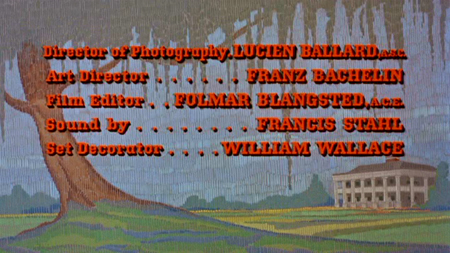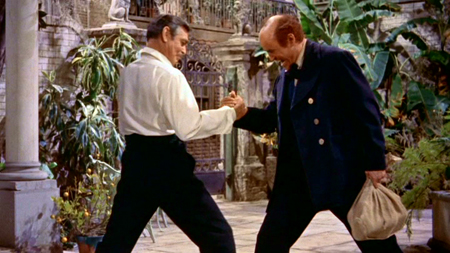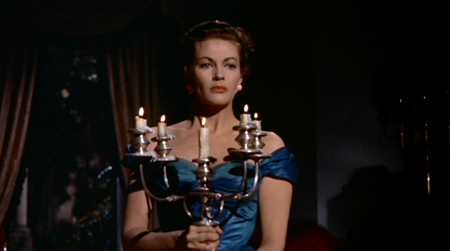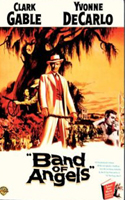BUY IT ON AMAZON: CLICK HERE!
STUDIO: Warner Bros.
MSRP: $19.97
RATED: Not Rated
RUNNING TIME: 127 minutes
SPECIAL FEATURES:
· Theatrical trailer
The Pitch
"It’s
Gone
With the Wind meets Beauty and the Beast!"
The Humans
Clark
Gable, Yvonne de Carlo, Sidney Poitier
The Nutshell
A young
woman named Ms. Starr (de Carlo) finds her life ripped out from under her when,
on a single day in pre-Civil War Kentucky, her father days and it is revealed
she was the offspring of her father and one of his slaves. Quick as you can say
"civil protest," Ms. Starr is packaged up and shipped down to
block. She’s bought by Clark Gable impersonating a decent man, who treats her
well. But damned if she don’t have her dander up about "privilege"
and "class" and "human rights," now, and won’t stand for
none of his pandering.

"They may take our lives, but they’ll never take our plaster columns!"
The Lowdown
All
joking at the expense of entitled young woman aside, the basic structure of Band
of Angels‘ set-up forms a wicked hook. For any person to be told that
he or she is something less than human can crush the spirit; I imagine the
impact would be greater if the person were to fall from more lofty a height. Though
the scenario put forth in the first act here strains at the limits of
believability, the actions themselves are compelling. In the space of a single
scene, Ms. Starr goes from grieving daughter to chattel. It’s almost worthy of
Dumas.
The
remainder of the film contains much less in the way of material to chew on.
What promises to be a Ben-Hur return from slavery largely
ignores its own impetus in favor of a genteel recounting of the tale of Beauty
and the Beast, though who exactly fits into each role remains just slightly
fluid. The backdrop of the emerging war between the states serves as little
more than local color, occasionally peaking somewhere short of allegory for Ms.
Starr’s unfortunate relationships.
That last
is what struck me as particularly odd about Band of Angels. Shouldn’t
the allegories go the other way around? Our history of narratives shows we occasionally
bend large scopes to inform aspects of our characters, but when we’re dealing
with strict allegory, or character metaphor, we usually go from the human-level
to the wider issue, such as a division between brothers stands in for the whole
of the Civil War. Not so in this film, in which the war exists only in the
story to parallel Ms. Starr’s adolescent tumults.

It was a gentlemen’s war.
It’s in
that egocentrism that de Carlo’s character breaks the film for a modern
audience. I find it endlessly fascinating to speculate on the political and
social climate of the era that produced this film and its ilk, but that’s not
exactly critical in nature. What I do have authority to pick on is the chauvinism
that seems to function as spine for nearly everything that happens in the
script. Forget for a moment that the film starts out with a woman losing her
humanity, and instead focus on the way that Ms. Starr is incapable of learning
any form of social justice or ethics without it being condensed into the form
of a man. She is an idiot, in the blank-mind sense of the word, and incapable
of functioning without the men around her. There are moments that the Beauty
rebels, but they all are undertaken with the goal being the attraction of
attention from the Beast of choice. It’s intriguing, as an artifact, that this
sort of narrative exists, but it doesn’t make for a smooth cinematic
experience.
Raoul
Walsh (White Heat) directs with his typical motionless camera and
theater-going angles, but there are worse aspects of the production,
specifically the editing. One gets the impression that there was a great deal
more material shot or planned for this film, and a good chunk of it ended up
ripped from the womb during editing. The pacing is rough, at best, in terms of
dramatic buildup; even worse, the flow of time is rudely interrupted at
various, startling points throughout. A brief conversation with a slave in a
kitchen cuts immediately to Ms. Starr crying over that slave’s sale to another
plantation; Gable’s character invites Ms. Starr to dinner, which she refuses,
though she then appears in the very next scene, coiffed and gowned and tossing
down the mint juleps.

5/9 Jewish.
If there
is any reason to feel an affection for Band of Angels it’s because of the
presence of a young Sidney Poitier in the role of Gable’s trusted man. This is
a couple of years after Blackboard Jungle, and Poitier’s
careful intensity is well-managed, dropping little hints now and then about
where the actor will go for 1961’s A Raisin in the Sun. His dialogue
errs on the side of heavy-handedness, but he’s still a pleasure to watch on
screen.
Other
than that, there is little to interest about Band of Angels apart from
its presence in the historical context. Period pieces from eras that would now
also be considered period themselves present an audience with a steady picture
of historical interpretation, which has always been a moving target.
The Package
Enjoy a
theatrical trailer, compliments of the chef.
